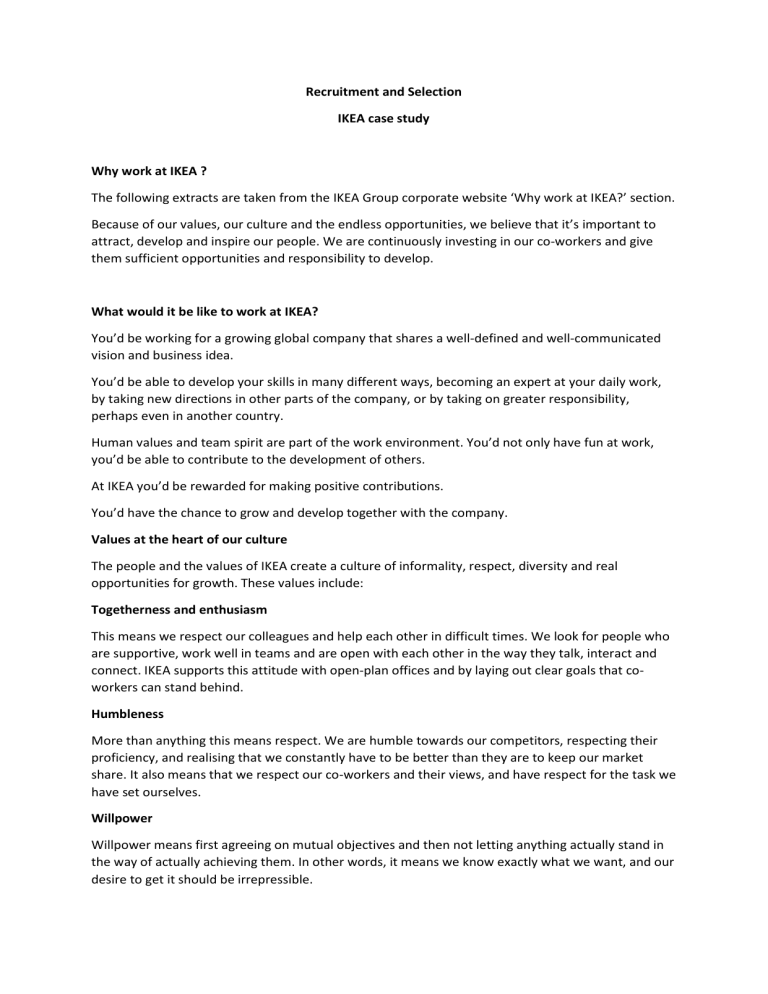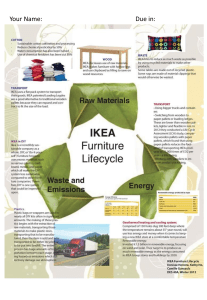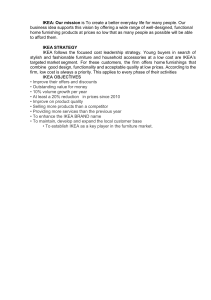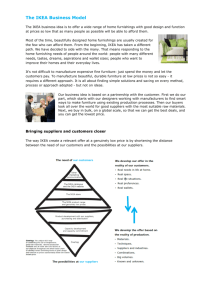
Recruitment and Selection IKEA case study Why work at IKEA ? The following extracts are taken from the IKEA Group corporate website ‘Why work at IKEA?’ section. Because of our values, our culture and the endless opportunities, we believe that it’s important to attract, develop and inspire our people. We are continuously investing in our co-workers and give them sufficient opportunities and responsibility to develop. What would it be like to work at IKEA? You’d be working for a growing global company that shares a well-defined and well-communicated vision and business idea. You’d be able to develop your skills in many different ways, becoming an expert at your daily work, by taking new directions in other parts of the company, or by taking on greater responsibility, perhaps even in another country. Human values and team spirit are part of the work environment. You’d not only have fun at work, you’d be able to contribute to the development of others. At IKEA you’d be rewarded for making positive contributions. You’d have the chance to grow and develop together with the company. Values at the heart of our culture The people and the values of IKEA create a culture of informality, respect, diversity and real opportunities for growth. These values include: Togetherness and enthusiasm This means we respect our colleagues and help each other in difficult times. We look for people who are supportive, work well in teams and are open with each other in the way they talk, interact and connect. IKEA supports this attitude with open-plan offices and by laying out clear goals that coworkers can stand behind. Humbleness More than anything this means respect. We are humble towards our competitors, respecting their proficiency, and realising that we constantly have to be better than they are to keep our market share. It also means that we respect our co-workers and their views, and have respect for the task we have set ourselves. Willpower Willpower means first agreeing on mutual objectives and then not letting anything actually stand in the way of actually achieving them. In other words, it means we know exactly what we want, and our desire to get it should be irrepressible. Simplicity Behind this value are ideas like efficiency, common-sense and avoiding complicated solutions. Simple habits, simple actions and a healthy aversion to status symbols are part of IKEA Questions: 1. In what ways could an employer seek to assess qualities of togetherness, humbleness, willpower and simplicity among candidates in the course of a recruitment and selection process? How accurate do you think judgements made along these lines are likely to be? An employer could, after an interview make the interviewed people play a game together. A game of teamplay, that combines both logic and stress. This game would be good to see their capacities, but we could also watch the reaction they’d have when they’ll discover the results: to see their humbleness etc… If you fail the game but have a very good reaction compared to the results, you could be hired too. I think making a judgement on person at first sight, or with a very short delay, is very complicated. This is why putting them in a relatively stressful environment could make us see their real faces faster. 2. What selection methods could IKEA employ to assess whether potential workers can ‘develop skills’ and take on new directions and responsibilities? I also think they could play another game. A game totally invented, where they couldn’t know the rules before. Like that, we could see their likeliness to adapt themselves in an environment they don’t known, how they react with something unknown etc.. It has to be a team game, to see who are the people that stand out being leaders. 3. To what extent should an organisation like IKEA attempt to recruit and select workers who embody organisational culture? Give reasons for your answer. Identify some possible negative outcomes of aligning selection with organisational culture. The idea of recruiting and selecting workers who embody the organisational culture of a business isn’t a bad idea. It allows to keep the company’s spirit, spread its value, and train its employees to better themselves according to the value of the company, leading to a brand-new brand loyalty. Thanks to this, If for an unknown reason they have to leave, those value will follow them forever and they’ll bring the values of your company everywhere they go. Thanks to this process, everybody will know your company trained them, and it would enhance your brand image. The only problem I see with this method is that it limits the diversity of your teams and makes you to keep a single point of view. Source: www.ikea.com in Rees and French (2010): pages 172-173




